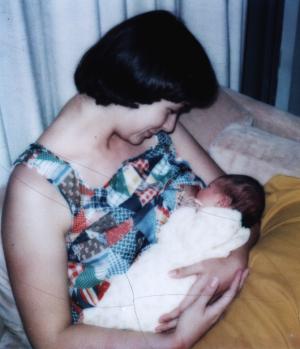Breast Feed Your Baby for as Long as Possible
 Most pediatricians agree that breastfeeding a newborn is best. I agree! This method of feeding offers the following benefits:
Most pediatricians agree that breastfeeding a newborn is best. I agree! This method of feeding offers the following benefits:
- Breast milk is uniquely suited for an infant's digestive system. It meets all of your baby's nutritional needs. Amazingly enough, breast milk actually changes, as your baby develops, to meet her/his requirements. For example, as your baby grows and demands more milk, a mother's breasts produce the amount necessary, filled with substance different from the milk required by a newborn infant. As your child begins to take less breast milk because s/he is getting nutrition from other sources, breasts begin to produce less milk. The symbiosis between breast milk and a baby's physical needs, is simply beautiful and cannot be duplicated by anything else! Think about the changes that occur every single day: in the morning, breast milk has a higher volume/lower fat content that gradually reverses throughout the day. In the evening, a lower volume/higher fat content allows the baby to remain full for a longer amount of time.
- The quality of breast milk, with its high fatty acids, contributes greatly to an infants nerve and brain development.
- Try as they might, even the largest manufacturers of infant formula have been unable to duplicate breast milk -- every mother and child have a unique system of supply and demand.
- Babies who are breastfed have fewer ear infections, fewer respiratory infections and have many fewer gastrointestinal problems. It's a rare child who experiences any difficulty digesting mom's milk!
- When a mother breast feeds, she and her child develop a much closer attachment. A newborn's eyes can focus on objects about 9 inches away -- that's the distance between a nursing baby and her/his mother's face. Nice, how that works out!
- A baby will nurse just long enough to get full. They basically can't overeat. And mother's can't push a baby to finish. This can happen when babies are fed formula.
- Now for the benefits moms get: every time a mother nurses, her uterus contracts; in effect she 's doing isometric exercises without breaking a sweat! Nursing mother's can consume huge numbers of calories every day and still lose weight due to the amount of calories it requires to feed a growing child! Nursing mothers can get back into their pre-pregnant clothes much sooner than non-nursing mothers.
If you are a mother who is unable to breastfeed for more than a month or so, it is important that you do not beat yourself up, even after reading 1-7 above!
Mothers who don't breastfeed their babies need to make certain they connect with their baby in much the same way a nursing mother does by holding her/him, in the same position a breastfeeding mother would, whenever the baby is being fed.
Monitor your baby's weight so you don't encourage or push her/him to finish a bottle, when they've turned away and begin to show interest in other things. This may involve working more closely with your pediatrician and/or mid-wife and/or a public health nurse. You definitely want to make sure you feed your baby enough just not too much!
For mothers who want to breastfeed, Little Pal's Child Care offers a quiet, comfortable room for you to nurse your child in the morning, before you leave and in the evening, when you pick your child up. Sometimes a baby just can't wait! Little Pal's will work with each nursing mom to meet her needs, by storing breast milk safely, by making sure that when giving your child a bottle of breast milk, that it's heated to just the right temperature and by following your wishes regarding what should happen if your baby is hungry, and you're late in arriving for pick-up or your supply of expressed breast milk is gone.
